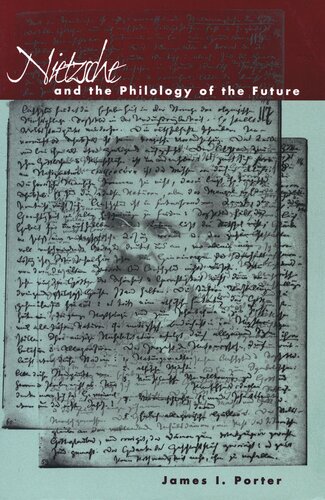

Most ebook files are in PDF format, so you can easily read them using various software such as Foxit Reader or directly on the Google Chrome browser.
Some ebook files are released by publishers in other formats such as .awz, .mobi, .epub, .fb2, etc. You may need to install specific software to read these formats on mobile/PC, such as Calibre.
Please read the tutorial at this link: https://ebookbell.com/faq
We offer FREE conversion to the popular formats you request; however, this may take some time. Therefore, right after payment, please email us, and we will try to provide the service as quickly as possible.
For some exceptional file formats or broken links (if any), please refrain from opening any disputes. Instead, email us first, and we will try to assist within a maximum of 6 hours.
EbookBell Team

4.4
32 reviewsDrawing on Nietzsche's prolific early notebooks and correspondence, this book challenges the polarized picture of Nietzsche as a philosopher who abandoned classical philology. It traces the contours of his earliest philological thinking and opens the way to a fresh view of his later thinking. The book's primary aim is to displace the developmental logic that has been a controlling factor in Nietzsche's reception, namely the assumption that Nietzsche passed from a precritical phase to an enlightened phase in which he liberated himself from metaphysics. A subsidiary aim is to decenter the view that fastens onto The Birth of Tragedy as a dramatic turning point in Nietzsche's thought. For Nietzsche, questions about the religion, art, and history of the classical world are bound up with fundamental questions about knowledge, culture, history, and the status of the subject. From his early writings, Nietzsche finds it difficult to separate questions about modernity from those about antiquity. Nor are the problems of classical philology ever far from his mind, even toward the end of his career. By showing how frequently the "later" Nietzsche appears in the early writings, the author hopes to provoke reflection on the adequacy of current characterizations of Nietzsche, and not just to raise questions about the periodization of his life and thought. The book traces Nietzsche's efforts, throughout his career, to determine the ways in which philosophy and philology are symptomatic of modern cultural habits, ideologies, and imaginings. In the form of a cultural anthropology, he may even have outlined the most trenchant model still available for confronting the ghostly specters that haunt Western society. Nietzsche's incessant preoccupation with the symptomatology of the modern subject—its ailments, its allusions, and the signs of its irrepressible presence—unifies his oeuvre more than any other single question. The author argues that Nietzsche arrived at this inquiry from a philological perspective, according to which subjective identity is viewed as part of a historical process. Embodied in practices, habits, and institutions, these inheritances of culture—of which classical antiquity is a crucial part—undergo the vicissitudes of transmission, decipherment, reconstruction, reception, and especially falsification (whether through unwilled or deliberate misunderstanding). All of these factors are intimately bound up with the ways in which subjects form themselves.